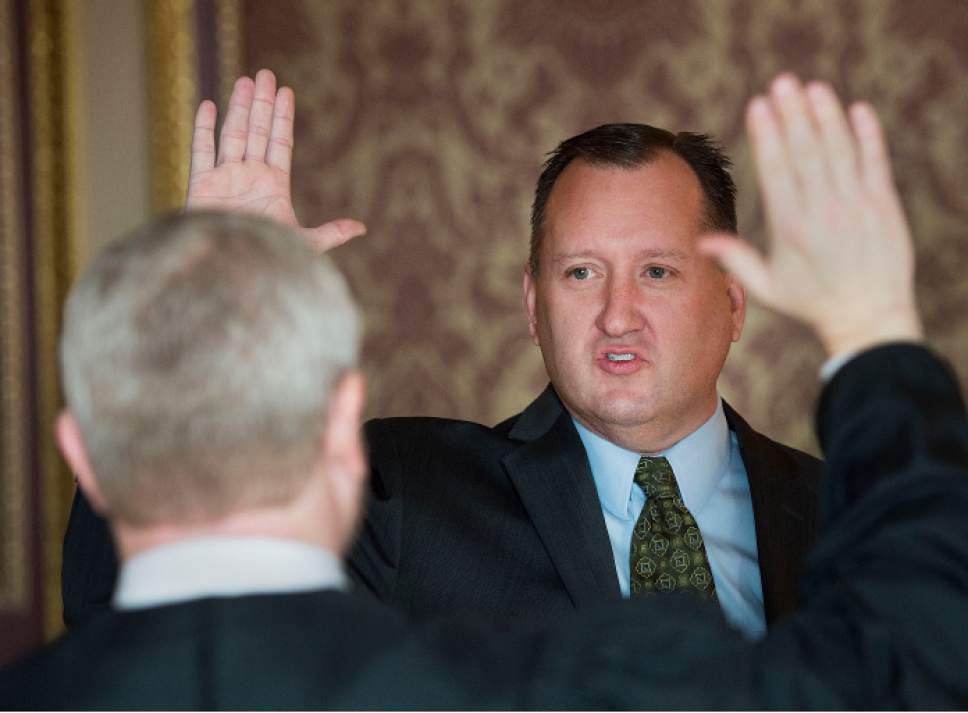This is an archived article that was published on sltrib.com in 2017, and information in the article may be outdated. It is provided only for personal research purposes and may not be reprinted.
A mysterious trust — which some former Utah League of Cities and Towns officials asserted was private and not subject to public scrutiny — actually is a governmental entity that uses taxpayer money, according to a state auditor's report released Friday.
That comes after former league Executive Director Ken Bullock had paid himself $80,000 from that "Utah Municipal Finance Cooperative II Trust" without disclosing it to league officials — saying such reporting was not required because it was private money.
"The league board members were unaware the trust even existed" until recently, said state Auditor John Dougall.
The new audit called for the trust to disband, and to turn over its remaining funds to the league. The audit said the trust's organizing documents had called for it to disband by 2012, but it never had.
The audit also said, upon its recommendation, the trust is "taking steps to recover certain funds as part of its winding-up process."
League President Steve Hiatt, who is also Kaysville's mayor, said the trust transferred $320,000 to the league Friday. Dougall said the trust retained about $75,000 to handle possible taxes and closeout expenses.
Hiatt and Dougall said most league board members learned about the trust's existence when another recent audit looked at league finances and found that Bullock had improperly charged $57,000 on the league's credit card (repaid later) to travel to his son's college basketball games. He resigned amid those findings.
That earlier audit discovered the trust and questioned the $80,000 that Bullock was paid or reimbursed by it.
The new audit disagrees with assertions by Bullock and other trust board members that it was a private entity not subject to public disclosures.
The audit traced the trust's origins back to 1993, when it was formed and received about $1.3 million of excess public money from another cooperative that helped cities obtain low-cost bonds. The money was supposed to be used to improve services offered by the league.
The trust also participated in the Public Treasurer's Investment Fund, which only government agencies may do — so it is a governmental entity, the audit said.
While many league board members had not known about the trust, Bullock did — and used its money sometimes a bit obscurely.
For example, he used it to pay for a $120,000-a-year contract with the Deseret News to place "sponsored stories" about the league and cities on its website. Hiatt said Bullock told league officials the money came from private donors.
Hiatt said the league likely has a legal obligation to honor that contract until it ends in September, but likely will not renew it.
"It's much harder to justify the project with public funds as opposed to a private donor, which is what we were told was the case," he said.
Hiatt added the league had been in an awkward position until now "because we stand as the beneficiary of a cooperative entity that we really had no administrative control over."
Dougall said the audit found that the trust's money generally was used primarily on behalf of the league. However, he said, some payments to the trust's finance director, for example, appeared "unnecessary and excessive," and many expenses were not properly documented.
The audit was short — two pages. Dougall said that happened because auditors were trying to work "as quickly as possible on behalf of the beneficiaries to ensure as much of the money was preserved [as possible] to be transferred to them."
The trust's directors included a written response saying it was intended to be a private entity and had operated in good faith. Still, it said it does not contest the auditor's findings.



